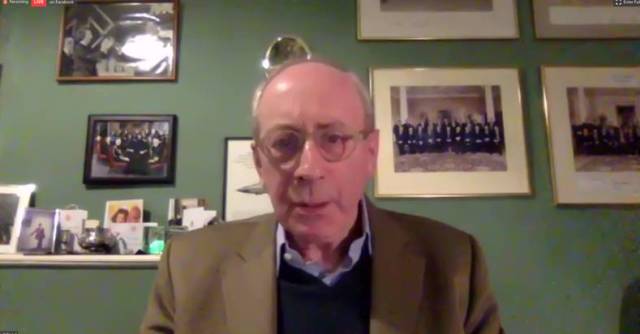 Sir Malcolm Rifkind speaking at the 19 January webinar.
Sir Malcolm Rifkind speaking at the 19 January webinar.
Veteran Conservative politician Sir Malcolm Rifkind served as foreign secretary in the final years of John Major’s administration and has remained active in international affairs ever since. Most recently, he has been named to head a 10-person team which will review the future of the Institute of Commonwealth Studies.
The announcement in 2020 of plans for the institute’s closure caused a stir in Commonwealth and academic circles, prompting the University of London to launch an inquiry and to appoint Sir Malcolm as its chairman.
So when the Conservative Friends of the Commonwealth group held an event “in conversation with” Sir Malcolm on 19 January, it was only natural that the first questions in the follow-up Q&A session should be about the role of today’s Commonwealth.
In response to a question from Commonwealth Round Table’s Mark Robinson about the organisation as an arm of soft power for the UK, Sir Malcolm took the opportunity to explore its raison d’être.
“It is worth asking ourselves,” Sir Malcolm said, “why did 54 countries which used to be part of the empire want to remain linked to one another with the Queen as head of the Commonwealth.” He added that some countries also still maintained the Queen as the Head of State. He said that “whether the empire was good or bad…the last thing they [former colonies] would have wanted to do is have any ongoing links particularly with the United Kingdom or have the Queen as head of state” unless the Commonwealth was doing something right.
He described the Commonwealth as “unique” – an organisation which transcended geographical, religious and ethnic boundaries. Sir Malcolm said that it remained “a microcosm of the world as a whole”. While making it clear that he didn’t want to exaggerate the ongoing role of the Commonwealth, the former Foreign and Commonwealth Office minister said that it would be “a sadder world” without the organisation and that many countries on the outside wanted to be a part of such a body with shared values.
On the inquiry into the future of the Institute of Commonwealth Studies, which will conduct its review from January to June, Sir Malcolm said that it was very important to look at the terms of reference agreed with the University of London. He said that he could not pre-empt the enquiry, but his team would be reviewing how best to achieve the future of Commonwealth studies, considering whether there was another way to do this and looking at how the institute’s work could remain a “vibrant part” of the work at the University of London.
In response to a question from Nicholas Watts, Fellow at the Institute of Commonwealth Studies and Coordinator of the Independent Forum of Commonwealth Organisations (IFCO), Sir Malcolm explored China and the Commonwealth. Pointing to India as one of the Commonwealth’s leading players, Sir Malcolm said that India had chosen to be non-aligned during the Cold War. He said: “Such has been China’s aggression towards India…that the Indian government has dropped that [non-aligned] approach and is now working closely with Japan, with the United States, with Australia, with other Asian countries for co-operation as an Indo-Pacific region…all because of Chinese aggression.”
“What on earth do India and Japan have in common except China?” he said, adding that these developments should cause China to reconsider its behaviour.
So what role is there for the Commonwealth in this development? Sir Malcolm said that the Commonwealth could not get directly involved, but because a number of Commonwealth countries – India, Australia, Pakistan, Sri Lanka, Malaysia, Bangladesh, the Pacific Islands and New Zealand – were affected, “the Commonwealth indirectly is involved in this issue”. He added that the world was likely to see greater co-operation between these countries which had all been on “the receiving end of China’s intolerance”.
The main part of the initial one-hour discussion centred on questions sent in by members of Conservative Friends of the Commonwealth.
These provided the opportunity for Sir Malcolm to share his perspective on a range of views on his career, working with Margaret Thatcher, serving on foreign policy bodies and as a member of the Commonwealth’s Eminent Persons Group in 2011. He also spoke frankly about devolution, Brexit, the end of the Cold War, the backlash against liberalism, President Trump, reform of the House of Lords and China and Russia in today’s world.
Asked about lessons from many years in foreign policy work, he frequently came back to the need for continuing discussions through summits which, he said, put pressure on leaders to deliver immediate results.
“Dialogue between political leaders is crucial as a first step towards resolving issues,” he told his audience.
The full session, which can be found below, is available on YouTube.



